Recommended Products
Application
Mimetic columns are used in protein chromatography, affinity chromatography and dye resins. Mimetic columns have been used in studies to develop anti-inflammatory therapeutics.
Signal Word
Warning
Hazard Statements
Precautionary Statements
Hazard Classifications
Flam. Liq. 3
Storage Class Code
3 - Flammable liquids
WGK
WGK 1
Flash Point(F)
95.0 °F - closed cup
Flash Point(C)
35 °C - closed cup
Personal Protective Equipment
dust mask type N95 (US), Eyeshields, Gloves
Certificates of Analysis (COA)
Search for Certificates of Analysis (COA) by entering the products Lot/Batch Number. Lot and Batch Numbers can be found on a product’s label following the words ‘Lot’ or ‘Batch’.
Already Own This Product?
Find documentation for the products that you have recently purchased in the Document Library.
K Clark et al.
FEBS letters, 471(2-3), 182-186 (2000-04-18)
Integrin alpha4beta1 is a major leukocyte adhesion receptor that is a key target for the development of anti-inflammatory therapeutics. With the dual long-term goals of developing a reagent for use in high-throughput inhibitor screening assays and for crystallisation trials and
Tsutomu Arakawa et al.
Protein expression and purification, 63(2), 158-163 (2008-10-14)
MEP HyperCel resin, one of the Protein-A mimetic columns, is designed to bind antibodies at physiological pH and elutes the bound antibodies at mildly acidic pH. We have tested aqueous arginine solution for washing and elution of the resin. To
C R Lowe et al.
Trends in biotechnology, 10(12), 442-448 (1992-12-01)
Affinity chromatography has been extensively refined over the past few years to meet the more stringent criteria being placed on recombinant proteins as therapeutic products. New developments in the design of selective and stable ligands for affinity chromatography are establishing
S J Burton
Methods in molecular biology (Clifton, N.J.), 11, 91-103 (1992-01-01)
Dye-ligand affinity chromatography is performed with an adsorbent consisting of a solid support matrix to which a dye has been cova-lently bonded. The protein mixture is passed through a packed bed of adsorbent that selectively binds proteins that are able
Our team of scientists has experience in all areas of research including Life Science, Material Science, Chemical Synthesis, Chromatography, Analytical and many others.
Contact Technical Service









